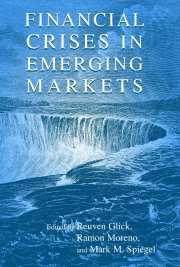Book contents
- Frontmatter
- Contents
- Preface
- Contributors
- 1 Financial Crises in Emerging Markets: An Introductory Overview
- PART I DETERMINANTS AND PROPAGATION OF FINANCIAL CRISES
- PART II CAPITAL FLOWS AND REVERSALS
- 5 Uncertainty and the Disappearance of International Credit
- Discussion
- 6 International Capital Inflows, Domestic Financial Intermediation, and Financial Crises under Imperfect Information
- Discussion
- 7 Private Inflows when Crises Are Anticipated: A Case Study of Korea
- Discussion
- PART III INSTITUTIONAL FACTORS AND FINANCIAL STRUCTURE
- PART IV POLICY RESPONSES
- Index
Discussion
Published online by Cambridge University Press: 04 August 2010
- Frontmatter
- Contents
- Preface
- Contributors
- 1 Financial Crises in Emerging Markets: An Introductory Overview
- PART I DETERMINANTS AND PROPAGATION OF FINANCIAL CRISES
- PART II CAPITAL FLOWS AND REVERSALS
- 5 Uncertainty and the Disappearance of International Credit
- Discussion
- 6 International Capital Inflows, Domestic Financial Intermediation, and Financial Crises under Imperfect Information
- Discussion
- 7 Private Inflows when Crises Are Anticipated: A Case Study of Korea
- Discussion
- PART III INSTITUTIONAL FACTORS AND FINANCIAL STRUCTURE
- PART IV POLICY RESPONSES
- Index
Summary
While the recent literature on financial crises in emerging markets is enormous, two clearly distinct positions have emerged. The first one, which I have called the bad policy view elsewhere (Chang, 1999), holds that observed crises have been the inevitable consequence of misguided government policies. In particular, according to this view, implicit or explicit government guarantees to private borrowing from abroad induced private agents to borrow too much and/or to take too much risk. The accumulation of hidden liabilities resulting from this process led, ultimately, to the collapse of the policy regime and to economic crisis (see McKinnon and Pill, 1996; Dooley, 2000; and Krugman, 1998).
An alternative view stresses not policy mistakes but financial panics. Proponents of this view argue that the chief force behind recent crises was a sudden loss of confidence by holders of short-term liabilities of developing countries. Such a confidence loss resulted in the bankruptcy of those financial systems whose potential short-term liabilities in hard currency exceeded the liquidation value of their assets, a condition that Velasco and I have called international illiquidity. [Chang and Velasco (1999a); see also Cole and Kehoe (1996) and Radelet and Sachs (1998)]. Notably, this view stresses that crises may have occurred in countries that were illiquid but essentially solvent.
Given this context, it is natural to start the study of Menzie Chinn and Ken Kletzer's essay by assigning it to one of the two camps just described. To some extent, the essay is an attempt to integrate the bad policy and the financial panic views. However, I found it fruitful to think of the essay as providing ammunition to the bad policy camp. This is because the specification of government policy is, as will be clear shortly, the key aspect of the analysis.
- Type
- Chapter
- Information
- Financial Crises in Emerging Markets , pp. 238 - 242Publisher: Cambridge University PressPrint publication year: 2001



